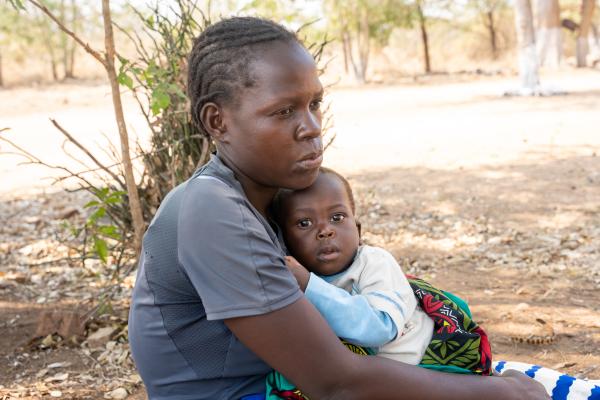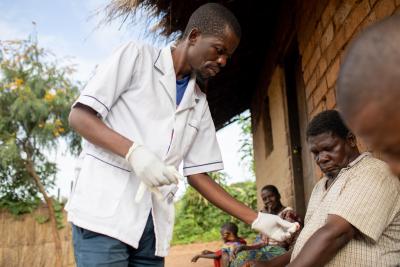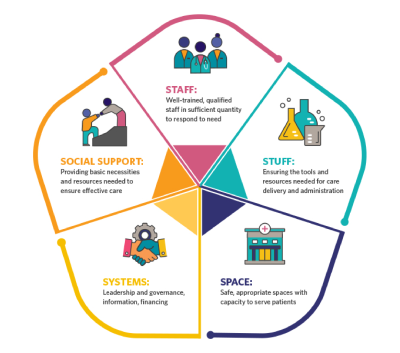Theory of Change

Joseph King Mizere
Building Strong Health Systems
Partners In Health (PIH) Malawi acts on the belief that the best way to guarantee high-quality, dignified care is to rely upon and invest in local health systems.
What does building a health system look like? It requires well-trained staff; proper and ample medication and supplies; health facilities with reliable space, electricity, and running water; and universally shared best practices that ensure patients receive quality care. We work with the Malawi government partners to reach these goals by accompanying them every step of the way, in solidarity through times of struggle and celebration.
The Role of Communities
Even the best clinics and hospitals are insufficient in guaranteeing care if people cannot access them. That’s why Community Health Workers (CHWs) are key to building strong health systems. They are the bridge between communities and clinics, finding the most vulnerable among their neighbors and accompanying them through care.
Often, care provided by PIH Malawi extends beyond the medical and addresses the whole patient. We understand that a mother cannot undergo cancer care and lose work without receiving economic support, a tuberculosis patient cannot endure strong medications on an empty stomach and a patient showing symptoms of COVID-19 cannot take public transportation to her local testing site.
From providing food, cash transfers, transportation to housing, PIH Malawi remains committed to ensuring health is a human right for all.

Non-communicable Diseases (NCDs) clinical officer providing care to an NCD client during one of the home visits done through the Chronic Care Unit.
Zack DeClerck
PIH’S “FIVE S’S”
We look at health system strengthening as a mix of five fundamental principles: staff, stuff, space, systems, and social support. Removing any one item would result in a weaker health system overall.
PIH Malawi’s approach is one of accompaniment. We work side-by-side with our friends, colleagues, and partners at all levels whether they are community-based, local health authorities, or global health advocates, to deliver the highest quality care.
We take our best practices and conduct research to demonstrate our impact and to educate current and future leaders at the local, national, and global levels. We are an organization that is diverse, nimble, and rises to the challenges we encounter with optimism, compassion, and tenacity.

Tyson Katundu
Theory of Change
1. CARE
We deliver high-quality health care where it does not exist—ensuring every person’s right and ability to survive and thrive. We treat the whole person by providing routine, equity-based care, as well as specialized, advanced care.
2. TRAINING
We invest in ongoing clinical education and training for our staff at every level to improve patient care and strengthen health systems for the long term. Through our clinical residency and fellowship programs, we continue to train future generations of leaders in global health and equity.
3. INFLUENCE
We advocate for national and global health policies that prioritize, rather than marginalize, the most vulnerable among us. We fight widespread bias and dogma with rigorous evidence-based results.
4. REPLICATION
We support the Malawian government and other partners by sharing our approach, research, and best practices to ensure equitable access to dignified quality health care. Through PIH’s University of Global Health Equity and our teaching hospitals, PIH Malawi prepares the next generation of social medicine practitioners and global health leaders.
HOW WE DO IT
1. SOCIAL SUPPORT
We provide social support to patients through food, housing, educational and financial assistance, and more because we believe that maintaining good health requires more than medical care.
2. TRAINING
PIH Malawi is committed to building strong healthcare workforces through mentorship, education, and clinical training across all levels of care.
3. NURSING
PIH Malawi is committed to providing education, supporting, mentoring, and partnering with nurses and midwives, who are a vital pillar of the healthcare workforce.
4. SURGERY
We improve surgical care through training, resources, and research: Addressing a critically unmet need within public health systems.
5. PARTNERSHIPS
We believe lasting change is achieved through strong partnerships. Our partnership department develops, prioritizes, and manages strategic partnerships with implementing and technical partners, donors, Ministry of Health, and other relevant ministries in Malawi.
6. GENDER EQUITY
We serve patients of all gender identities and sexual orientations, prioritizing their medical and social needs to create a more equitable world.
7. COMMUNITY HEALTH WORKERS
We draw on the expertise of the people who know their community best as we provide culturally relevant health care. Community Health Workers (CHWs) are trained members of the community that provide linkage between community members and health facilities. PIH Malawi has trained 1233 CHWs from areas surrounding 14 health facilities available in Neno since 2007.
CHWs visit between 20 to 40 households they are assigned to every month where they screen and identify different health conditions, but with a primary focus on non-communicable diseases (NCDs), malnutrition in under-five children, family planning and maternal health as well as neonatal health.
8. ADVOCACY
We advocate for the global right to health movement, calling on legislators and leaders worldwide to support health care as a human right.